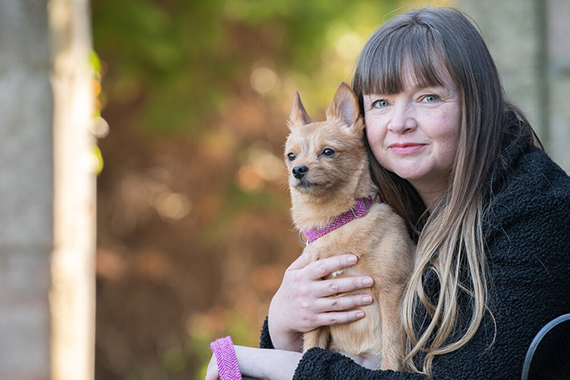
A counsellor has used her years as a dog walker to help grieving families whose pets have died.
Wendy Andrew, 45, is the founder of The Scottish Pet Bereavement Counselling Service, a business she created after being around animals her whole life and seeing first-hand the difficulty of losing one.
“I grew up on the outskirts of Glasgow with Labradors, my parents being retired Kennel Club-registered breeders,” Wendy said. “I understand how strong the bond between people and their companion animals can be – and how devastating it is to lose that companion.
“As a professional dog walker, we do encounter the death of our client dogs from time to time. The incident which had the greatest impact on me and inspired me to take action was when Belle, whom I had walked since she was a puppy, got into some ibuprofen at home. Ibuprofen is highly toxic to dogs and can be fatal. It was a very uncertain time.
“Her owners were utterly distraught, and I wanted to make sure I was supporting them in the right way.”
VOLUNTEER
Wendy volunteered with a trainer and behaviourist for six months when she first became a dog walker and in 2019 qualified as a pet bereavement counsellor and founded The Scottish Pet Bereavement Counselling Service.
“When I qualified, I initially just helped my dog-walking clients but so many people said to me that they wished they’d had support available to them when they were grieving the loss of their pets,” she said. “So I decided to open the service up and make it accessible to anyone who needs it.
“I’ve worked with many people to help them cope with losing their pet – because a pet is just as much a family member as anyone else is and it can affect you in the same way.”
When covid-19 hit, Wendy decided to write and self-publish her self-help book ‘How To Recover From Pet Loss – Supporting You On Your Journey To Acceptance’ – a book that became a #1 Hot New Release in eight categories on Amazon.
“When the covid-19 pandemic hit, I realised that writing a book was an effective way to reach out and support grieving pet parents and a low-cost alternative to counselling during these times of financial uncertainty and social restriction,” she said. “I was inspired to write my book by my friend who is a life coach and was writing her book, so we became accountability buddies and supported each other during that process.
“In addition to pet bereavement counselling, I have taken more courses to learn about a range of topics which have proved beneficial to mental, emotional and physical health and wellness. I’ve been told that my counselling and book have been good for loss of any kind and I myself have been surprised at how much this kind of support can apply to all walks of life.
“You can apply grief and the process of living with it to many different situations – from anticipatory grief to moving on.”


